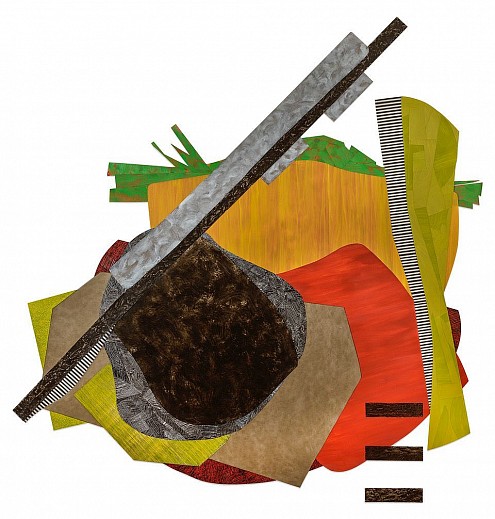
Artblog | Nanette Carter's journey as artist, educator, and Anonymous was a Woman award winner
April 16, 2022 - Susan Isaacs for Artblog
Susan Isaacs interviews artist Nanette Carter, whose journey includes years as an art educator, as well as 17 years as a full time professional artist sustaining herself through sales of her work. An amazing story. Nanette Carter is featured in a 2-person exhibit at Towson University now through April 23. Be sure to catch it is you’re in the Baltimore area.
Master artist Nanette Carter focuses on contemporary issues with an abstract vocabulary of form, line, color, and texture that explore the impact of social media, social injustice, and the balancing of life responsibilities in the 21st century through painted mylar collages. Her recent retirement from teaching has given her time to make much new work and have three exhibitions in 2022 following on a major survey of 30 years of work in 2021 at the N’Namdi Contemporary in Detroit, MI.
Nanette Carter: I went to Pratt for my graduate degree, and I majored in printmaking and minored in drawing. And so, a lot of that, of course, is still reflected in the work. I taught for 20 years at Pratt and enjoyed it immensely. The students are smart. They’re talented. I would always tell them “I probably learned, just as much from you, as you have from me.” They come from all over the world; it’s quite international so it made for a wonderful experience, I think, for everyone in the classroom.
I received several faculty grants during the course of that time. One of the grants, in fact, was able to send me to Cuba in 2018. I had a solo show there and we actually created a catalog with that money. I brought art materials and taught a class. The year before I left Pratt, I received what they call the Sienna Art Institute Residency, which is a collaboration with the Institute in Italy and Pratt. Because of Covid the year that I was supposed to go had to be pushed to the next year, so my very last year at Pratt I went to Sienna for six weeks. It was there that I heard that I was up for the Anonymous was a Woman, and they asked me to please send my images and I had to write a little piece on my work and what it’s been like the last 40-50 years. What I think is so amazing about this grant is that it is really aimed at artists who’ve been out here for some time, but maybe have not been acknowledged or recognized in the fashion that they should be. And so I applied and then I heard that I received that grant. The timing couldn’t have been better to receive the money when I was retiring. And I felt very good leaving and I had great memories, and I learned so much from the faculty. They are amazing artists. I am still in contact with them, and probably will be for the rest of my life. We get together and go to each other studios, which is always so much fun and very helpful.
SI: You are now with the Berry Campbell Gallery.
NC: Berry Campbell approached me, which is always nice, you know when someone wants you. I love the two women running the space—Christine Berry and Martha Campbell. They are a force to be reckoned with. These women are working hard; there are an awful lot of women artists with the gallery.
SI: In fact, the gallery has a bit of a connection to Philadelphia because they represent the Elizabeth Osborne estate now, and she was a teacher of mine at PAFA and a very well-known artist from Philadelphia. A lot of artists are teachers. Did you always want to teach or was teaching a way to make a living?
NC: Well, you know when I went to Oberlin College for my undergraduate studies, I knew then that I was going to teach. And I in fact took some education classes. I had done some teaching in the summer. I used to have the summer job working at the parks in Montclair, New Jersey, and I would do the arts and crafts. I did that in the summer, while I was at Oberlin College, and so I knew I wanted to teach. I come from a home of teachers. My mother taught first grade where of course reading is so important. She ended becoming a reading specialist, and she went back to school and ended up becoming a vice principal. My father got his doctorate in divinity. He never had a church, but I can tell you, for Black men, if you wanted to get into politics, you almost had to go through the Church. We can think of Martin Luther King, Jesse Jackson, and Ralph Abernathy. Several of these men ended up going into politics, via the Church. The Baptist Church, in particular. So Dad got into politics. But as a preacher politician, you are also teaching and helping others. It’s that kind of service, that public service, that I think is so important.
I can recall when I went off to Oberlin a lot of my parents’ friends said “Oh my gosh you’re letting your daughter major in art. How is she going to make a living?” My mother would always reply, “Oh no she will teach.” When I went to prepare for my MFA I understood then, okay now I can possibly even teach on the college level. Continue Reading
Back to News
